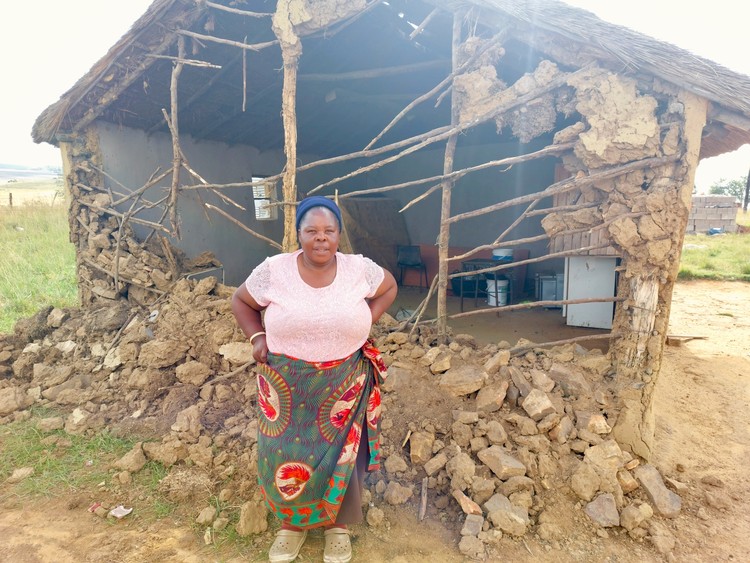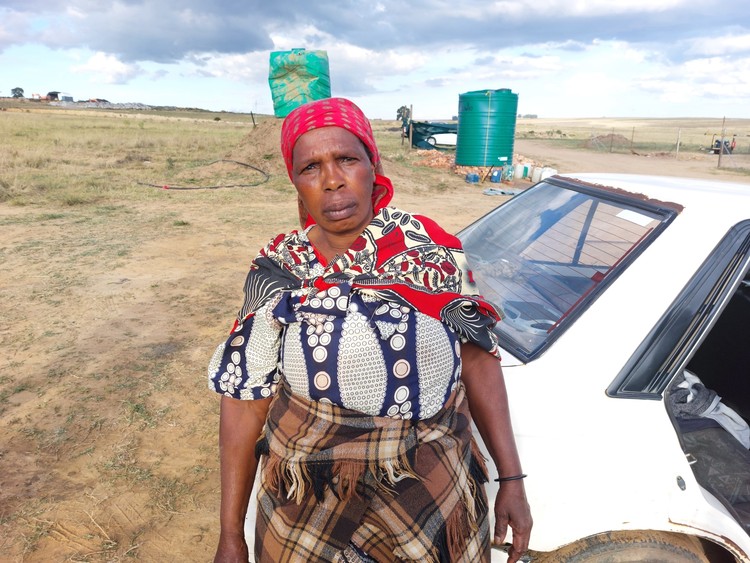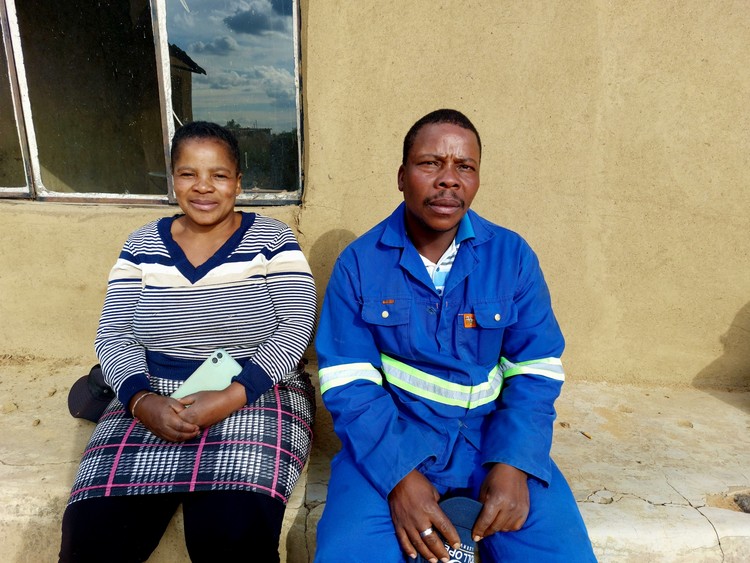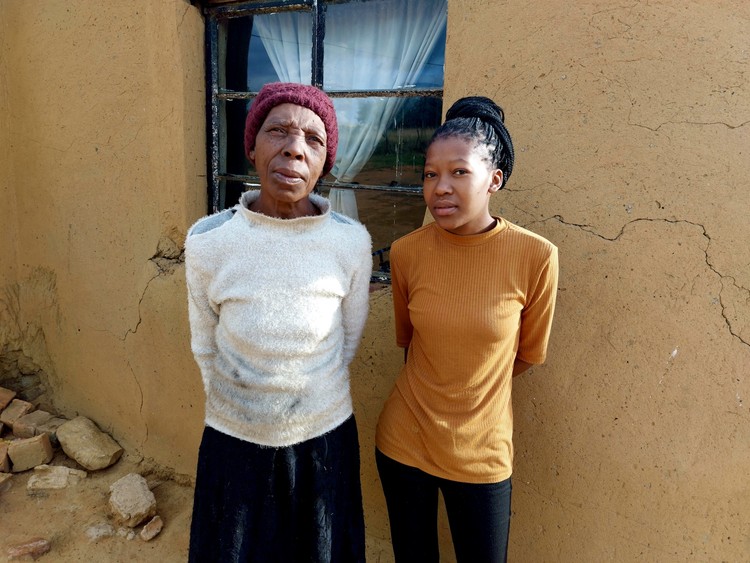Families to leave ancestral lands as coal mine expands
Land Claims Court orders Mpumalanga mine to build them permanent houses
Emily Nkosi’s home was destroyed by blasting at the nearby mine. Photos: Kimberly Mutandiro
- Seven families have been ordered by the Land Claims Court to move from an area in Mpumalanga where open cast coal mining is taking place.
- Blasting by the mine is dangerous for the families.
- The court said mining company, A Re Shomeng Holdings must build permanent homes for all the families nearby and they must be allowed to graze their cattle.
- The company had argued that unless they could extend their blasting the mine would have to close.
On a hot Wednesday afternoon in April, 59-year-old Emily Nkosi stood next to the ruins of her mud home in Kromkrans, Mpumalanga. Her family is one of seven to be relocated in terms of a court order, that will allow blasting to continue at the nearby Motshaotshile Colliery.
For the past six years, she has endured deafening noise and shaking from blasting from the nearby coal mine. But despite being warned about the danger, she has been hesitant to leave her ancestor’s land.
But the warnings became a reality when the whole one side of her late grandmother’s hut collapsed during blasting in April. “My grandmother’s hut was destroyed just like that,” she said.
Four families who lived even closer to the mine have already been moved. Police were sent to move the families when they resisted because most have the graves of their ancestors on their homesteads.
“My family arrived on this land in 1973, and I grew up here,” says Nkosi. “My late parents used to work on a farm here, but as the years went by, the mine took over. If there was another choice, I would never move from my home, leaving the graves of my ancestors,” she said.
But Nkosi and the other families have no other option.
In an order on 19 February 2024, the Land Claims Court directed that the families must move and that A Re Shomeng, which owns the mine, must provide new housing for them. The court said the families had agreed to move, but there had been a delay in building them new permanent accommodation. The mine had proposed temporary accommodation but the families had refused, saying this would be too disruptive.
In the meantime, mining ground to a halt, as the Department of Minerals and Energy had ordered blasting to stop. Unless blasting continued, the Court accepted, the mine would not be able to meet its commitments to supply Eskom and other customers with coal, the mine would close, and jobs would be lost.
The court said two families must be moved to temporary housing in mobile homes while permanent housing was built for all seven families. The temporary housing had to include adequate sleeping space, a kitchen, a lounge or dining room, and sanitation facilities commensurate with each family’s requirements. A rain tank was to be provided for water and a generator for electricity at the mining company’s expense until solar energy or an Eskom connection could be provided. Livestock belonging to all seven families must be allowed to continue to graze on the land, and the mine must provide transport and labour for the relocation.
The court also ordered the mine to engage with the families about the relocation process.
Letta Sibego has lived at Kromkrans since 1989.
But residents were unhappy about the relocation, and the community protested in February on Human Rights Day.
Letta Sibego, 65, said she arrived on the farm with her children and built a home in 1989.
She had resisted being moved until the police came on 8 March and forcefully loaded her belongings into a van and moved her to temporary accommodation. She says there is not enough space for her to sleep, and she has been sleeping at her son’s house. A permanent house is now being built for her, but she misses her old home. Every day, she goes back home to check if everything is okay.
“I lived peacefully in my home with no problems until the mine came and forced me to move,” said Sibego.
Cristina and Henry Soko worked on the farm for many years.
The Soko family arrived in the early 1980s. Christina Soko worked on the farm for many years and her family continued to live there after the farm owner left. Though the mine blasting affected them, the Soko family also resisted being moved until the police came.
“Where is our government when we are being forcefully removed? Where are our rights when things are this bad?” said Henry Soko, who was born on the farm 39 years ago and is also worried about the graves of his ancestors, which are on their homestead.
“They should not rush us,” said Julia Mabaso, who came back home after her belongings were taken to the temporary housing. She wants time to perform a traditional ceremony for her ancestors.
Zinhle Soko with her mother, Julia Mabaso, who wants to perform a traditional ceremony for her ancestors before leaving the farm.
Danjelle Midgley, attorney at the Centre for Environmental Rights, said the case demonstrated the power imbalance between a mine and a community. “The fact that the families were only told about whether the houses they were relocated to by the mine had basic water, sanitation, electricity, sufficient space, and grazing access during the court application shows the disdain for how mines treat communities [that are] in the way of their blasting operations.”
Alex Lenferna, of the Climate Justice Coalition, said the Kromkrans community is one of several in Mpumalanga that have suffered as a result of coal mining.
“On the one hand, the government claims to be moving toward net zero emissions by 2050, but based on their energy plans, they are delaying the closure of coal plants, and communities affected by coal mining continue to suffer.”
Meanwhile, the seven families have now approached a lawyer to assist in the case. Mahlaku Mahapa, sustainability manager for A Re Shomeng Holdings and Projects, said the mine was not in a position to comment as the matter is in court. Mahapa said they are engaging with the families through the attorney.
Support independent journalism
Donate using Payfast

Don't miss out on the latest news
We respect your privacy, and promise we won't spam you.
© 2024 GroundUp. This article is licensed under a Creative Commons Attribution-NoDerivatives 4.0 International License.
You may republish this article, so long as you credit the authors and GroundUp, and do not change the text. Please include a link back to the original article.
We put an invisible pixel in the article so that we can count traffic to republishers. All analytics tools are solely on our servers. We do not give our logs to any third party. Logs are deleted after two weeks. We do not use any IP address identifying information except to count regional traffic. We are solely interested in counting hits, not tracking users. If you republish, please do not delete the invisible pixel.




